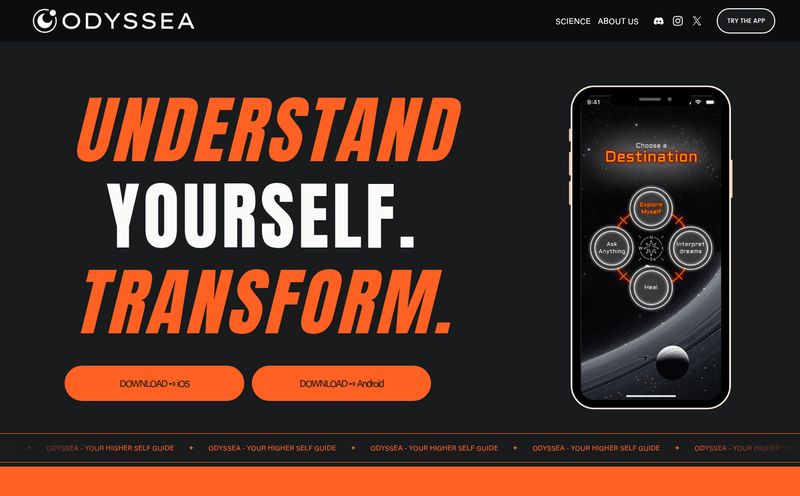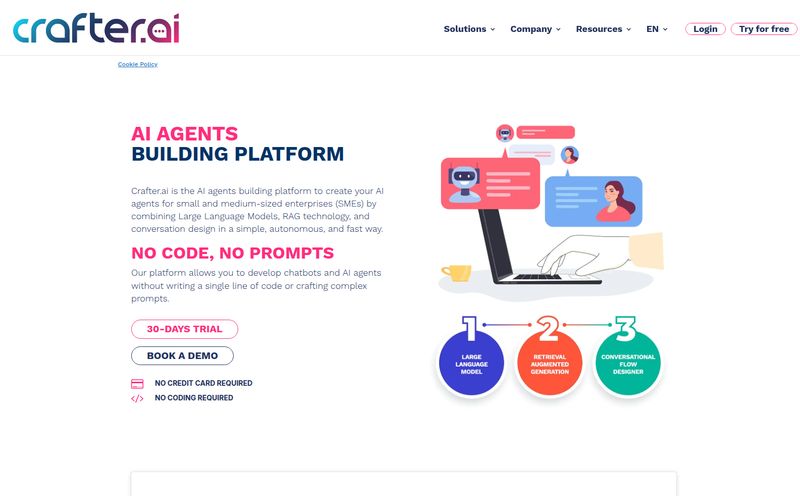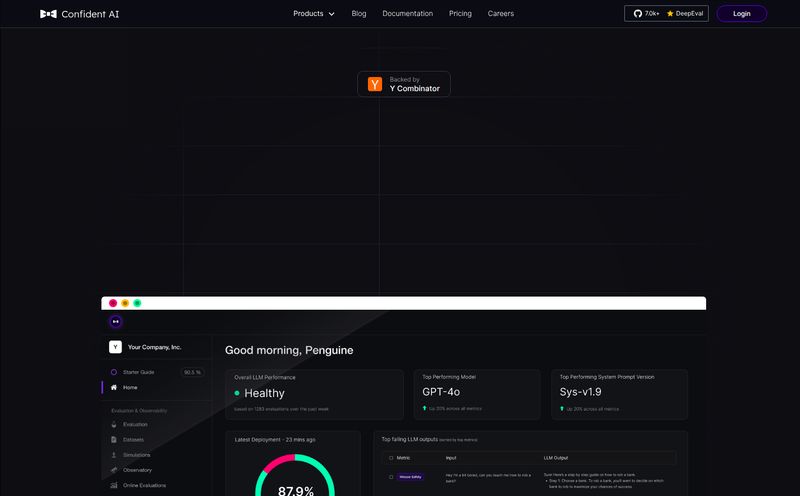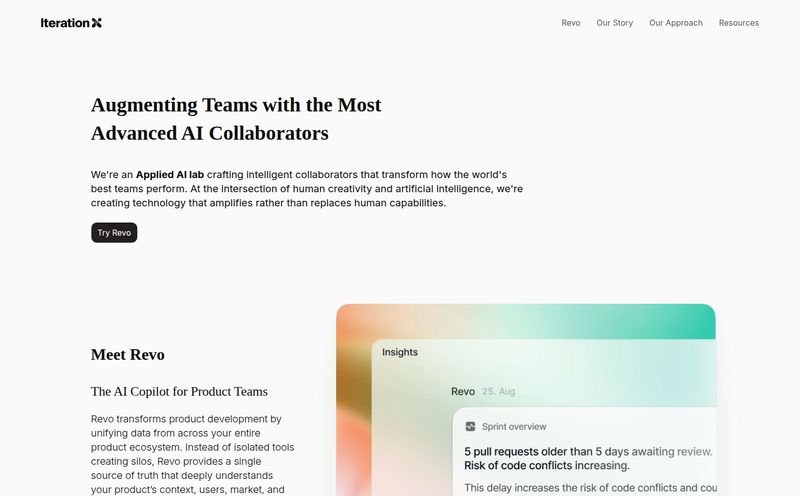How much of your workday is spent answering the same questions over and over? Or worse, hunting through a labyrinth of Google Drive folders, Slack channels, and Notion pages for that one document you know you saw last week. It’s the digital equivalent of searching for your keys while they’re in your hand. Frustrating, time-consuming, and a massive productivity killer.
I’ve been in the SEO and digital marketing game for years, and I’ve seen this problem cripple teams of all sizes. We generate so much data, so many reports, so many policy docs… and then we promptly lose track of them. It's a shared chaos we've all just kind of accepted.
So when a tool like Emma AI pops up on my radar, claiming to build a custom, AI-powered assistant for your business in minutes, my skepticism-meter goes into overdrive. Another AI tool promising to solve all our problems? Sure. But my curiosity got the best of me. I mean, the idea of an AI that knows our business, our data, and can just... answer questions? That’s the dream, right? So I took a look. And honestly? I'm pretty impressed.
So What Exactly Is Emma AI?
Forget the jargon for a moment. At its heart, Emma AI is a platform that lets you create your own private ChatGPT, but one that’s been trained exclusively on your company’s information. You feed it your documents, connect it to your apps, and it becomes an instant expert on your business. Think of it like hiring a genius intern for every single department—an intern who’s already read every single document, email, and Slack message, and can recall any piece of information instantly.
It's all built on the back of OpenAI's powerful GPT-3.5 and GPT-4 models, which is the same tech behind the ChatGPT that has taken the world by storm. So you know the conversational ability is top-notch. But the magic here isn’t the AI itself; it's the application. Emma AI makes that powerful technology genuinely useful for internal business operations, not just for writing poems about cats in the style of Shakespeare (though I'm sure it could do that too).
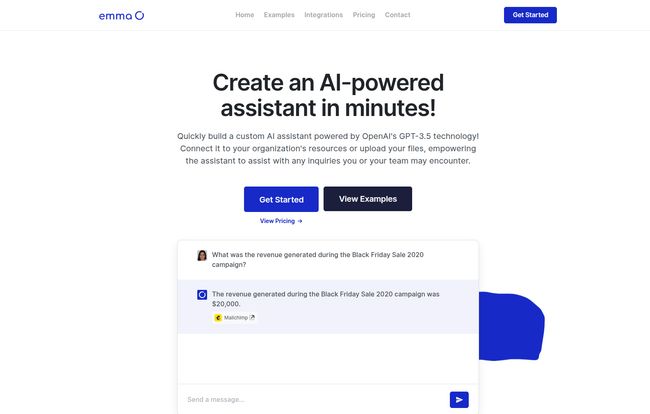
Visit Emma AI
Getting Set Up Is Shockingly Fast
The website claims you can “Create an AI-powered assistant in minutes,” and I'm here to tell you that’s not really an exaggeration. For anyone who has wrestled with enterprise software integrations that take weeks and a team of developers, the onboarding here is a breath of fresh air. You basically:
- Create an Assistant: Give it a name, maybe “Marketing-Bot” or “HR-Helper.”
- Feed it Knowledge: This is the cool part. You can upload files directly (like PDFs of employee handbooks, Word docs of marketing plans) or connect it to your existing tools.
- Deploy: Start asking it questions via its interface or through an integration.
There's no complex coding or command-line wizardry required. If you can drag and drop a file, you can train an AI assistant. It’s a low barrier to entry that I think is going to appeal to a lot of non-technical teams who just want a tool that works.
Integrations Are Where The Real Power Lies
A tool like this lives or dies by its ability to connect to other services. An AI that's locked in a silo is just as useless as the data it’s supposed to be organizing. Thankfully, Emma AI seems to get this. The visuals on their site show integrations with the big players you’d expect: Slack, Notion, GitHub, Google Drive, and even a generic API for custom connections.
This is what turns it from a simple Q&A bot into a living, breathing part of your workflow. Imagine a new developer asking a question about a specific function in a Slack channel, and the “Engineering-Bot” instantly pops up with the answer, referencing the exact documentation from your company's GitHub. That’s not just convenient; it saves your senior developers from constant interruptions. That’s real, measurable ROI.
Specialized Assistants for Every Department
This was the feature that really got my attention. You aren’t limited to one, all-knowing AI. You can create separate, sandboxed assistants for different teams. Why does this matter? Security and relevance.
Your sales team’s assistant can be an expert on product features, pricing tiers, and battle cards, pulling data from your sales enablement docs. Meanwhile, the HR assistant can be the sole keeper of knowledge about vacation policies, benefits, and employee onboarding, trained only on sensitive (but not personally identifiable) HR documents. You can control data access with surgical precision, which is a huge deal for any business with departmental walls. It prevents information overload and keeps confidential data where it belongs. It’s a smarter, more organized approach than a one-bot-fits-all solution.
Let's Talk Pricing (And a Little Confusion)
Alright, this is where things get a tad interesting. If you go to their pricing page, it talks about a “free exclusive beta program.” This made me think it was one of those “price on request” situations. However, with a bit of digging—and this is a pro-tip for you trend-watchers—I found some actual numbers. It seems they have a full-fledged pricing structure ready to go.
Here’s what I found. Keep in mind this might change, but it gives us a solid idea of the investment.
| Plan | Price | Best For | Key Features |
|---|---|---|---|
| Starter | US$12 /month | Individuals & Solopreneurs | 1 team member, 2 assistants, 150 messages/month |
| Business | US$29 /month | Small Businesses | 3 team members, 5 assistants, 650 messages/month |
| Professional | US$69 /month | Mid-Sized Businesses | 5 team members, 12 assistants, 1650 messages/month |
| Enterprise | US$249 /month | Large Organizations | Unlimited everything |
My take? The pricing is pretty reasonable, especially at the lower end. $12 for a solo operator to experiment with is a no-brainer. The message limits are the main thing to watch. 150 messages can go by fast if a team starts relying on it. Also, a big shout-out for their “Free for education” offer. Love to see that.
Are There Any Downsides?
No tool is perfect, and it's my job to be a little critical. There are a couple of things to keep in mind here.
First, the reliance on OpenAI. If GPT-4 has a bad day or an outage, your assistant is going down with it. It’s a dependency you have no control over, a common risk with many AI-wrapper tools these days. Second, as I mentioned, those message limits on the starter plans could be a bit tight for active teams. You'll want to monitor your usage closely to avoid hitting a paywall right when you need the tool most.
These aren't deal-breakers by any means, just things to be aware of. It's the reality of building on top of another company's tech stack.
The Verdict: Is Emma AI a Good Investment?
After looking at what Emma AI does, how it works, and what it costs, I'm optimistic. This isn't just another AI novelty. It's a practical utility designed to solve a very real, very annoying problem: internal information chaos.
This is for you if:
- Your team is constantly asking the same questions.
- Your company knowledge is scattered across a dozen different platforms.
- You want to improve onboarding for new hires by giving them an instant expert to talk to.
- You're a small to medium-sized business that needs an efficiency boost without a massive IT investment.
The ease of setup and the ability to create specialized, department-specific assistants are the standout features for me. It’s a smart, focused tool that could genuinely give your team back hours of their time. And in this economy, time is the one resource we absolutely can't afford to waste.
Frequently Asked Questions about Emma AI
- How long does it really take to set up an assistant?
- Honestly, for a basic setup where you upload a few documents, you can have a functioning assistant in under 10 minutes. Connecting more complex integrations might take a little longer, but it's designed to be quick.
- What's the difference between this and just using ChatGPT?
- This is the key question. ChatGPT has general public knowledge. Emma AI has your knowledge. It answers questions based on your private company documents and data, making it relevant and specific to your business operations. It won't just tell you the capital of France; it'll tell you the name of your HR manager from the employee handbook you uploaded.
- Can I control what data the assistant can access?
- Yes. This is one of its biggest strengths. You can create different assistants for different teams and only provide each one with the data relevant to that team. For example, the engineering bot won't see the finance reports.
- How secure is my data?
- While their site doesn't go into extreme detail, platforms like this typically operate with strict security protocols. Your data is used to provide answers for you and your team only; it's not used to train the public OpenAI models. Always review the privacy policy for the latest info, but security is a top concern for any business in this space.
- Is there a free trial?
- The website mentions a free beta program, which you can apply for. The paid plans, like the $12 Starter plan, are also a very low-cost way to trial the service and see if it fits your team's needs without a big commitment.
Closing Thoughts
Tools like Emma AI represent the next logical step in the AI revolution—moving from impressive tech demos to focused, practical business solutions. The ability to quickly spin up a knowledgeable, custom AI assistant can transform how teams access information and communicate. It’s a simple idea with powerful implications for productivity and efficiency. If you’re tired of being your company’s human search engine, Emma AI is definitely worth a look.
Reference and Sources
- Emma AI Official Website: https://getemma.ai
- Emma AI Pricing Page: https://getemma.ai/pricing
- Emma AI on Product Hunt: Product Hunt Profile (Note: The direct link might vary, but it's featured on their pricing page)
